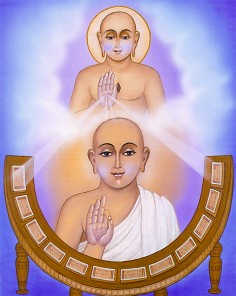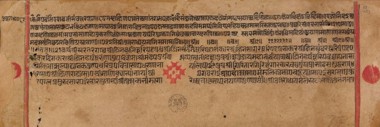Fifteenth Lecture: The True Monk[1]
He who adopts the Law in the intention to live as a monk, should live in company (with other monks), upright, and free from desire; he should abandon his former connections, and not longing for pleasures, he should wander about as an unknown beggar: then he is a true monk. (1)
Free from love he should live, a model of righteousness,[2] abstaining from sins, versed in the sacred lore, protecting his soul (from every wrong), wise, hardy, observing everything; he who is attached to nothing, is a true monk. (2)
Ignorant of abuse and injury, a steadfast monk should be a model of righteousness, always protecting his soul (from sins), neither rash nor passionate; when he endures everything, then he is a true monk. (3)
He who is content with lowly beds and lodgings, bears heat and cold, flies and gnats, is neither rash nor passionate, and endures everything, he is a true monk. (4)
He does not expect respectful treatment, nor hospitality, nor reverence, nor, indeed, praises; he controls himself, keeps the vows, practises austerities, lives together with other monks, meditates on his soul; this is a true monk. (5)
If he does not care for his life, or abandons every delusion, if he avoids men and women, always practises austerities, and does not betray any curiosity, then he is a true monk. (6)
He who does not profess and live on divination from cuts and shreds,[3] from sounds on the earth or in the air, from dreams, from diagrams, sticks, and properties of buildings, from changes in the body, from the meaning[4] of the cries (of animals)he is a true monk. (7)
Spells, roots, every kind of medical treatment, emetics, purgatives, fumigation, anointing of the eye, and bathing, the patient's lamentation, and his consolationhe who abstains from all these things, is a true monk. (8)
He who does not praise, or pay attention to, the warriors, Ugras,[5] princes, Brāhmaṇas, Bhōgas, and artists of all sorts, who abstains from this, he is a true monk. (9)
He who does not, for earthly gain, improve his acquaintance with householders, with whom he fell in as a monk, or was in friendly relation before that time, he is a true monk. (10)
A Nirgrantha is forbidden to take from householders, if they do not give it themselves, bed, lodging, drink, food, or any dainties and spices; he who is not angry at such occasions, he is a true monk. (11)
If a monk gets any food and drink, or dainties and spices, and does not feel compassion (on a sick fellow-monk) in thoughts, words, and deeds, (then he is not a true monk);[6] but if he has his thoughts, words, and acts under strict discipline, then he is a true monk. (12)
Dish-water,[7] barley-pap, cold sour gruel,[8] water in which barley has been washed: such loathsome food and drink he should not despise, but call at the lowliest houses (for alms); then he is a true monk. (13)
There are many voices on the earth, of gods, of men, and of beasts, dreadful, frightful, and awful noises; if he hears them without trembling, then he is a true monk. (14)
He who understands all religious disputations, [who lives together with fellow-monks],[9] who practises self-discipline,[10] who meditates on his soul, who is wise, hardy, and observes everything, who is calm, and does not hurt anybody, he is a true monk. (15)
He who, not living by any art, without house, without friends, subduing his senses, free from all ties, sinless, and eating but little, leaves the house and lives single, he is a true monk. (16)
Thus I say.
The name of this lecture, sa bhikkhū, is derived from the burden which runs through the whole of it and winds up every verse.
Lāḍhē, explained sadaṇuṣṭhānatayā pradhānaḥ. Lāḍha is also the name of a country in western Bengal, inhabited, at Mahāvīra's time, by uncivilised tribes, see part i, p. 84, note 1. The etymology of both words is doubtful.
Compare the note on p. 161 of part i. The 71st chapter of Varāha Mihira's Bṛhat Saṃhitā treats of vastrachēda, rents, etc. of clothes; the 51st, of aṅgavidyā, forebodings from the body; and the 53rd, of vāstuvidyā, property of buildings; chapters 88, 90, and 95 are devoted to the forebodings from the cries of birds, female jackals, and crows.
A conjectural rendering of vijaya, which cannot be taken in its ordinary meaning "victory." The commentary explains it śubhāśubhanirūpaṇābhyāsaḥ.-Notice the absence of astrology from the above list of prophetical arts practised by strolling friars apparently to insinuate themselves into the good graces of laymen and women. If Greek nativity had already risen to importance, it certainly would have been mentioned. For it has ever since held a firm hold on the Hindu mind.-This remark also applies to XX, 45. But in Sūtrakṛtāṅga I, 12, 9, astrology (saṃvacchara) is mentioned; it is, however, the ancient astrology of the Hindus, not the Greek one.
The Ugras and Bhōgas were Kṣatriyas. The former were, according to the Jainas, descendants of those whom Ṛṣabha, the first Tīrthakara, appointed to the office of kōṭwals or prefects of towns, while the Bhōgas were descendants from those whom Ṛṣabha acknowledged as persons deserving of honour. Comp. Hoernle, Uvāsaga Dasāo, Appendix, p. 58, and my edition of the Kalpa Sūtra, p. 103, note on § 18.
The commentators supply these words; something to that purport is wanted to make out a consistent meaning, but there is not so much as a hint of it in the text itself. As it stands now, the meaning would be just the opposite of that given in the translation, which is in better accordance with the established custom.
Āyāmaga, it is rendered āchāmaka in Sanskrit, and explained avaśrāvaṇa, i.e. avasrāvaṇa. See also Leumann, Aupapātika Sūtra, Glossary sv.
 Ganadhar Sudharma Swami
Ganadhar Sudharma Swami
